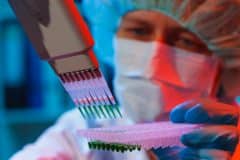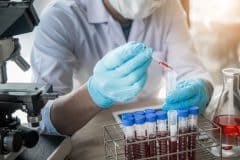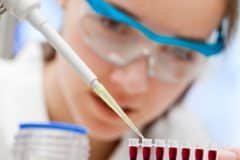Harala Halevi. Content promoted in cooperation with Roche, a representative of FoundationOne

In the recent past, cancer was considered a single disease, and most patients received chemotherapy and radiation, according to the location of the cancer and the findings of microscopic examination and imaging. Since the revolution in genetics, in the early 2000s, researchers have been able to identify hundreds of genes that cause cancer when mutated, and new drugs have been developed that target these mutations. The progress in the technological ability of genomic sequencing today makes it possible to diagnose the genomic profile (DNA) of tumors, and it makes it possible to identify which genomic mutations caused the development of the tumor. In some patients, tailoring treatment to the tumor's genomic profile may lead to better outcomes.
To detect genomic mutations in a particular tumor, a biopsy must be taken from the tumor tissue, but a surgical biopsy is an invasive procedure and not all patients can perform it. Sometimes, even though the patient already has a sample taken from a previous biopsy, the sample is not large enough or of high quality, and therefore it is not possible to carry out genomic mapping of the tumor. Patients who cannot perform a genomic test using a tissue biopsy can now perform a genomic test using a blood test known as a "liquid biopsy". The blood test scans dozens of genes at the same time, and thus can identify the genomic changes relevant to the tumor. The blood test is quick and convenient, and accompanied by only minimal and local pain, and it allows certain patients to perform genomic mapping, even if they cannot undergo a surgical biopsy.

A blood test that detects genomic mutations in the tumor allows for personal monitoring of the tumor, more often, while it is spreading or changing, and when it develops resistance to treatment, a figure that constitutes one of the biggest challenges in cancer treatment. Prof. Tamar Safra, director of the oncology service at the Ichilov Medical Center, explains the advantages of the blood test: "A surgical biopsy is an invasive procedure that usually has to be done under imaging. Beyond that, I cannot perform it on every patient, nor often. On the other hand, genomic mapping from a liquid biopsy (by taking a blood sample), is a more convenient and easier way. A blood sample can be taken frequently, and it is possible to monitor changes that occur during time and treatment, a liquid biopsy allows us to monitor the tumor in a better way and to know if it is responding to treatment. For example, it is possible to identify at a very early stage if resistance has developed to the treatments the patient is receiving and moreover to get accurate information about the type of resistance.
However, Prof. Safra points out that tests of the type based on tumor DNA in the blood are still in the development stages and the goal in the future is to improve the technology in order to make the blood tests capable of detecting cancer in its early stages. In general, when analyzing the information available in the literature on personalized medicine, we rely on evidence based on case stories or studies on tens or hundreds of individual patients, so the clinical effectiveness is not clear enough.
The idea behind liquid biopsy began years ago, when researchers discovered that fragments of DNA were leaking from cells of fetuses into their mother's bloodstream. Later it turned out that DNA segments fall into the bloodstream from every growing cell, including tumors. A liquid biopsy, such as FoundationACT, is a blood test for genomic mapping with a level of accuracy and sensitivity of 99%, which locates segments of DNA and performs a genomic profile of the tumor. These findings help to make more accurate treatment decisions for patients, especially when there are additional treatment options that would not have been taken into account without a genomic profile.

"There are cases where we used the liquid biopsy to examine whether there are additional or more effective treatments that we can give to the patient. For example, a liquid biopsy can help me know whether the patient will respond to a targeted biological treatment, for example an inhibitor to the HER2 receptor or another treatment that helps eliminate cancer cells whose DNA repair inhibition mechanism is damaged," explains Prof. Safra.
Prof. Safra believes that genomic mapping through a blood test, a test that is already available in a number of hospitals in Israel on a limited scale, has the potential to change the way cancer is diagnosed and treated. "I believe that liquid biopsy will become the preferred diagnostic method in the future. In addition to the fact that the test is easy to perform and does not require a complicated invasive procedure, the ability to perform continuous genomic tests allows us to more effectively monitor the progress of the disease and the effect of the treatment."
The article was written in collaboration with Roche, a representative of FoundationOne, and is offered to readers as marketing content

9 תגובות
Bless everyone who cares for people with cancer
A dream will be that the day will come and our genius minds
They will find a medicine that by taking the pill the patient will get better.
What a good dream this is!!!!
God bless and the dream will come true. We are losing so many people and it hurts...and it is just scary as if we are living in Russian roulette.
Good luck to all involved in the craft, may you be blessed!
In relation to nutrition, on the contrary, there is technology that checks with metabolic blood tests what the cancer consumes and how it gets its energy, and according to that adapt a personal diet that will starve the cancer, but it must not be published to the public
Unfortunately, people die every day from cancer, especially from prostate cancer that is not detected early with a psa test and a fluoride test is the best.. Why are they not detected?
Men die every day and families suffer grief including the children because there is no information about early detection that can be done...
Someone can say today - what is early detection
For prostate cancer in private or in Kopfh
Rehabilitate one doctor or one professor and say??
Why should the science website publish articles that are advertisements for pharmaceutical companies? Publish the news without the link to the commercial company, because a liquid biopsy can also be performed through a health insurance company where the person is insured.
The surgeon opens, sees metastases and closes.
Prolonged hospitalization and pain due to cut ribs.
When will PET be used to detect metastases without opening the chest?
BSD
Well, it's time for you to finally agree with people and not be moved if there is progress in the field of health. And let's not play ego games. And we waved at a pharmaceutical company and money. Because in the end human life depends on it. (today it's mine, tomorrow it's yours)
Unbelievable. Another advertising article and another advertising article and another advertising article until a test that tells us which chemotherapy to use to support the pharmaceutical companies....
Trillions of dollars invested in the last 40 years and zero results. The life expectancy that 'increases' in cancer patients is not related to drugs but to earlier diagnosis.
I wonder why they don't publish articles about IPT chemotherapy, for example, which has existed for decades in the world (and in Israel, of course, is not recognized in the 'medicine basket').
I wonder why the billions are not invested in liquid nitrogen treatment technology.
I wonder where there are articles about the 'Anna Budwig' protocol or the 'Ann Wigmore protocol' that have saved thousands of patients over decades through an anti-cancer diet...
where is my father I want to see articles by the father of the site's founder.